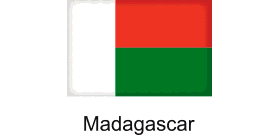 World Bank boss excited about Madagascars’ cconomic
World Bank boss excited about Madagascars’ cconomic
The World Bank is committed to assist Madagascar to jumpstart its economic recovery and put the country back on the path to development.
According to the Regional Vice President for Eastern and Southern Africa at the World Bank Victoria Kwakwa, the parallel shocks of the pandemic, the war in Ukraine resulting in economic challenges, and climatic impacts, have taken a significant toll on inclusive growth in this country of over 28 million people.
Writing on her blog, Kwakwa said: “The pandemic-induced downturn reversed previous gains and triggered a recession that was about 3 times deeper than in the rest of Sub-Saharan Africa, with a collapse in export revenues and private investment resulting in a contraction of GDP by 7.1% and of income per capita by 9.8%.”
“As a result, an additional 2.4 million people are estimated to have fallen below the international poverty line in 2020, bringing the poverty rate to a record high of 81.9%. The protracted impacts of the war in Ukraine does not bode well for the future of the Big Island,” she added.
She said decelerating economic activity among trading partners is likely to significantly reduce growth in Madagascar in 2022 mainly reflecting a deteriorating outlook for the European Union which absorbs more than one third of the country’s exports while the higher international oil prices will contribute to a widening trade deficit as refined petroleum products account for 5.1% of GDP.
According to Kwakwa, the recent adjustment to pump prices will reduce fiscal pressures but the government’s liabilities, vis-à-vis fuel distributors, remain high.
“These multiple shocks and risks are an opportunity for Madagascar to find a path out of its seeming poverty trap building on its rich diversity and comparative advantage: a high-quality labor force, unique natural resources, the positioning of a number of products on the premium market, and fast Internet connection.”
“These recent crises have demonstrated the capacity of Madagascar to maintain macroeconomic stability, thanks to past fiscal consolidation efforts, increased social protection interventions for the most vulnerable, a strengthened operational framework for the Central Bank and large concessional financing flows,” she said.
In her blog she wrote: “As I embark on my first official visit to this beautiful island as Regional Vice President for Eastern and Southern Africa at the World Bank, I am excited to meet and engage with a diverse array of stakeholders, policy makers and change makers who collectively share the ambition of realizing significant development gains for Madagascar.”
These are exciting and challenging times for Africa and Madagascar.
She said the country can achieve more inclusive growth by improving job opportunities through acceleration of private sector investment; enhancing human capital outcomes; and strengthening resilience against shocks.
“Progress will only be possible if political ownership of this shift is reinforced, and the fate of poor and vulnerable populations is put at the center of the policy debate. This will only succeed if there is a coalition for inclusive growth of all actors in Madagascar,” she observed.
“I look forward to my conversations with the authorities, key actors in Madagascar and the Malagasy people, to whom I’ll be asking these fundamental questions: What needs to be done to reduce poverty and inequalities in Madagascar in the face of various present and future shocks? How can jobs be created especially for dynamic young Malagasy people who constitute half of the population and who only want to serve their country better? How can the provision of basic social services: education, health be improved, and also access to electricity and the development of connectivity infrastructure? What can we do differently and how can the World Bank better support Madagascar in its aspirations? These are critical conversations to have to feed into the current ongoing discussions as we finalize our engagement strategy for the coming five years in Madagascar, known as the Country Partnership Framework (CPF).”
Kwakwa said the World Bank’s program in Madagascar has increased significantly in recent years to respond to urgent crises but also to jumpstart economic recovery and put the country back on the path to development.
With 26 projects supporting education, nutrition, health, social protection, road construction, access to energy, water, financial inclusion, environment, the blue economy and other sectors, the Bank’s portfolio in Madagascar now stands at $3.4 billion. This includes a deliberate effort to refocus our operations on the most vulnerable areas and regions, including in the South.
“The World Bank Group stands ready to support the people of Madagascar and is ready to play its part,” she said.
